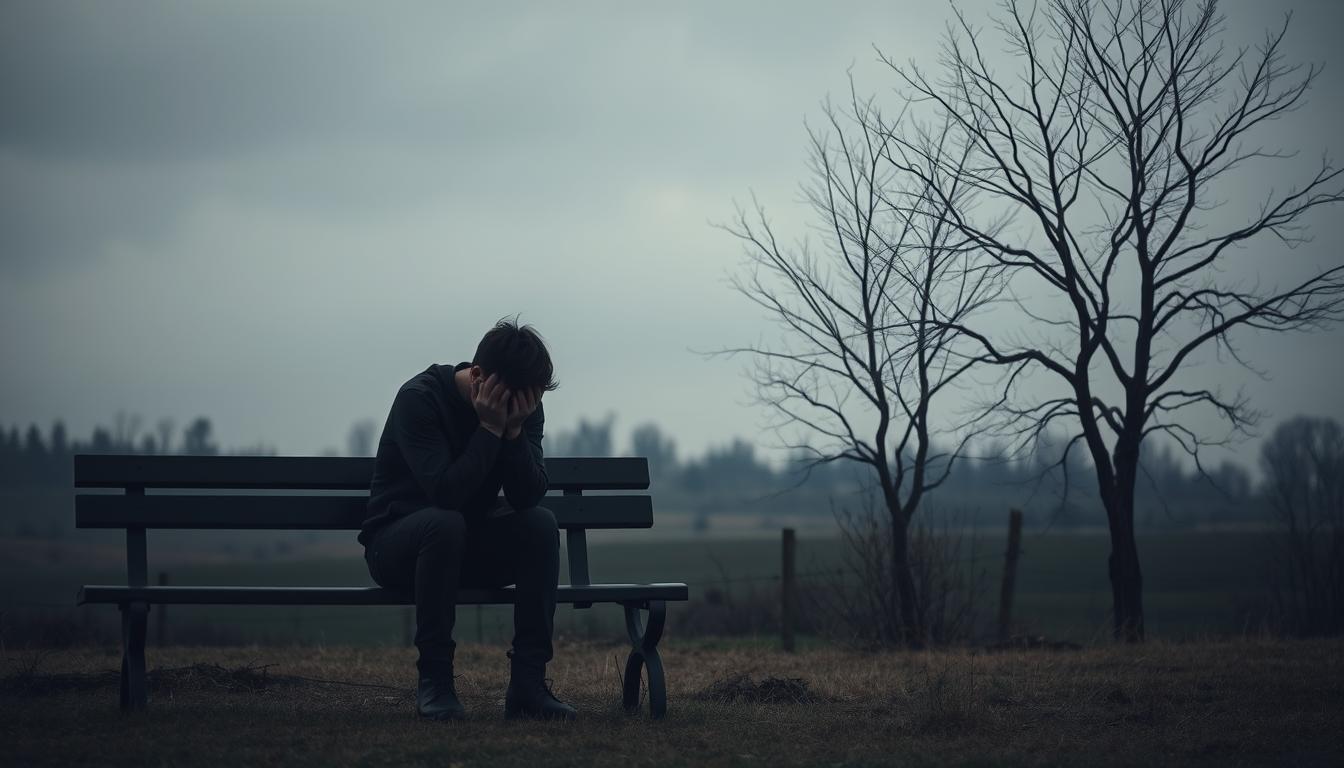I am a participant in the Amazon Services LLC Associates Program, an affiliate advertising program designed to provide a means for sites to earn advertising fees by advertising and linking to Amazon.com and affiliated sites. This post contains affiliate links. Privacy Policy
Your Guide to Understanding the Symptoms of Depression
Are you or someone you know feeling sad, hopeless, or empty all the time? Depression is a serious mental health issue that affects many people around the world.
It’s important to know the signs of depression to get help quickly. If you’re not sure about the symptoms of depression, you’re not alone. Many people find it hard to spot the warning signs, as they can differ from person to person.

Understanding mental health symptoms is the first step towards healing. In this guide, we’ll explore the common signs of depression. We aim to help you understand what you’re going through and where to find support.
Best brain supplement!
Key Takeaways
- Depression is a serious mental health condition that affects millions worldwide.
- Recognizing the signs of depression is crucial for seeking timely help.
- Symptoms of depression can vary from person to person.
- Understanding mental health symptoms is key to healing and recovery.
- Seeking support is essential for managing depression.
Understanding Depression as a Mental Health Condition
Depression is more than just feeling sad. It’s a complex mental health issue that affects many people. It impacts their daily lives, relationships, and overall well-being. Depression shows itself in different ways, making it important to know its symptoms.
The Difference Between Sadness and Depression
Sadness is a normal feeling everyone has at some point. But, depression is a long-lasting feeling of sadness that lasts weeks, months, or even longer. Unlike sadness, depression can happen without a clear reason. Mental health experts say, “Depression is not just a feeling; it’s a serious condition that needs proper treatment.”
“The biggest thing I learned is that depression isn’t just a low mood; it’s a complex condition that affects every aspect of a person’s life.”
The Prevalence of Depression in the United States
Depression is more common than you might think. About 1 in 5 adults in the United States experience depression each year. This means millions of people are struggling with it, making it a big public health issue. Knowing how common depression is helps raise awareness and support for those affected.
Knowing the common signs of depression is the first step to getting help. If you feel sad, hopeless, or don’t enjoy things you used to, it’s time to see a mental health professional. Using a depression symptom checker can also help understand your mental health.
What Are the Symptoms of Depression?
Recognizing depression symptoms is the first step to managing it. Depression affects emotions, physical health, and thinking. It can show up in many ways.
Emotional Symptoms and Warning Signs
Depression’s emotional symptoms can be strong and varied. You might feel sad, hopeless, or empty all the time. Not caring about things you used to love is common, along with feeling guilty or worthless. You might also get angry easily or have mood swings.
Some people feel anxious, restless, or always on edge. These signs can really affect your daily life and relationships.
Physical Symptoms of Depression
Depression isn’t just about feeling down; it affects your body too. You might eat more or less, or have trouble sleeping. Feeling really tired all the time makes everyday tasks hard.
| Physical Symptom | Description |
|---|---|
| Changes in Appetite | Increased or decreased hunger leading to weight changes |
| Sleep Disturbances | Insomnia or hypersomnia affecting rest and recovery |
| Fatigue | Persistent tiredness or lack of energy |
Cognitive Symptoms and Thought Patterns
Depression’s cognitive symptoms can be as tough as emotional and physical ones. It’s hard to focus, make decisions, or remember things. Thinking negative thoughts all the time can make you feel hopeless.
It’s important to understand these cognitive symptoms to find ways to cope and get help. Recognizing depression’s signs is the first step to recovery.
Behavioral Signs of Depression
Depression is more than just feeling sad. It can change how we act and what we do every day. These changes might start small but can grow bigger over time. Knowing these signs is key to spotting depression in ourselves or others.
Changes in Daily Activities and Routines
One big sign of depression is a change in what we do daily. You might lose interest in things you used to love. This could be hobbies, going to social events, or even simple tasks like cooking or cleaning.
Social Withdrawal and Relationship Changes
Depression can also make us pull away from others and change how we relate to them. You might start to avoid social events or feel far from friends and family. This can hurt our relationships and make it tough to get help when we need it.
Spotting these signs early is important for dealing with depression. By recognizing these changes, we can start to get better and improve our mental health.
How to Identify Depression Symptoms in Yourself
Recognizing depression symptoms in yourself is the first step to getting help. It’s important to know the emotional and physical signs of depression.
Self-Assessment Techniques
Self-assessment is a good way to spot depression symptoms. Pay attention to your thoughts, feelings, and actions. Ask yourself if you’ve felt sad or hopeless lately or lost interest in things you used to enjoy. Being honest with yourself is crucial in this process.
Tracking Mood Changes Over Time
Watching your mood over time can help spot depression patterns. Keeping a mood journal is a helpful tool. By writing down your feelings and experiences every day, you can see if you’ve been feeling sad or withdrawn. A consistent pattern of negative feelings or withdrawal from social activities could be a sign of depression.
| Symptom | Description | Duration |
|---|---|---|
| Persistent Sadness | Feeling sad or empty most of the day | More than 2 weeks |
| Loss of Interest | Loss of interest in activities once enjoyed | More than 2 weeks |
| Changes in Appetite or Sleep | Significant changes in appetite or sleep patterns | More than 2 weeks |
By being proactive and aware of your mental health, you can take the first steps towards understanding and managing your depression symptoms.
Recognizing Depression in Different Populations
Understanding depression means seeing its many symptoms in different groups. It’s not the same for everyone. It shows up in different ways in different ages and groups.
Depression Symptoms in Adults
In adults, depression often shows as sadness, guilt, and losing interest in fun activities. They might also feel tired, have changes in appetite, or sleep problems. It’s key to spot these signs early.
How Depression Presents in Teens and Young Adults
Teens and young adults might seem irritable, moody, or pull away from friends. They might act recklessly, use drugs, or do poorly in school. Knowing these signs helps offer support quickly.
Depression in Older Adults
Older adults might feel depressed as physical issues, memory loss, or mobility changes. It’s easy to mistake it for other health problems. Spotting it early can really help their life quality.
Knowing how depression looks in different ages helps us find the signs and get help. Whether it’s an adult, teen, or older adult, seeing the symptoms is the first step to help and recovery.
When to Seek Professional Help for Depression
Knowing when to get help for depression is a big step towards feeling better. If you’re feeling down, it’s important to know when you need professional help.
Warning Signs That Require Immediate Attention
If you or someone you know is feeling really sad or hopeless, get help right away. Losing interest in things you used to love, eating or sleeping too much or too little, or thinking about harming yourself are all red flags. These signs mean you need help from a professional.
Types of Mental Health Professionals and Treatments
Many mental health experts can help with depression. This includes psychologists, psychiatrists, and licensed therapists. They might use therapy like cognitive-behavioral therapy (CBT) or prescribe medication like antidepressants. The right treatment depends on how severe your symptoms are and what you need personally.
| Mental Health Professional | Specialization | Treatment Options |
|---|---|---|
| Psychologist | Diagnosis and therapy | CBT, talk therapy |
| Psychiatrist | Diagnosis and medication | Antidepressants, medication management |
| Licensed Therapist | Therapy and counseling | CBT, family therapy |
Conclusion
Recognizing depression symptoms is key to tackling this mental health issue. Knowing the emotional, physical, and cognitive signs helps you support yourself or others. This proactive step is crucial.
Depression symptoms vary across different groups. It’s important to understand these differences to offer the right support. If you or someone you know shows signs of depression, getting professional help is vital.
Being knowledgeable about mental health symptoms and emotional health signs is important. You can help create a supportive environment. Start by looking for resources and support from mental health experts.
FAQ
What are the common signs of depression?
Signs of depression include feeling sad all the time and losing interest in things you used to like. You might also eat or sleep differently, feel tired, or have trouble focusing. Sometimes, people feel worthless or guilty, and in extreme cases, they might think about dying.
How can I identify depression symptoms in myself?
Look for changes in how you feel and how much energy you have. Keep a mood journal to track your emotions and actions. This can help you see patterns and changes over time.
What is the difference between sadness and depression?
Sadness is a normal feeling when things are tough. Depression is a serious mental health issue. It makes you feel sad, hopeless, and lose interest in things for a long time.
Can depression cause physical symptoms?
Yes, depression can make you feel physically sick. You might eat or sleep differently, feel tired, or have headaches and stomach problems. You could also feel pain without any clear reason.
How does depression affect daily life and relationships?
Depression can make it hard to be social and enjoy activities. You might pull away from friends and family, or have trouble doing everyday tasks. It can also make it hard to find joy in things you used to love.
What are the warning signs that require immediate attention?
If you think about dying or feel extremely hopeless, get help right away. Severe mood swings or intense feelings of despair are also red flags. If you or someone you know is feeling this way, call a mental health professional or a crisis hotline.
What types of mental health professionals can help with depression?
Many professionals can help with depression. This includes psychologists, psychiatrists, therapists, and counselors. They offer treatments like therapy, medication, or a mix of both.
How can I track my mood changes over time?
Use a mood journal, a mobile app, or talk to a mental health expert. Tracking your mood can help you spot patterns and changes. This is useful for managing depression.
Can depression be treated?
Yes, depression can be treated. Options include therapy, medication, making lifestyle changes, and trying alternative therapies. A mental health professional can help you find the right treatment plan.
How can I support someone with depression?
Be supportive and understanding. Encourage them to get professional help. Offer to help with daily tasks or activities. Learning about depression can also help you support them better.
I am a participant in the Amazon Services LLC Associates Program, an affiliate advertising program designed to provide a means for sites to earn advertising fees by advertising and linking to Amazon.com and affiliated sites. This post contains affiliate links. Privacy Policy


